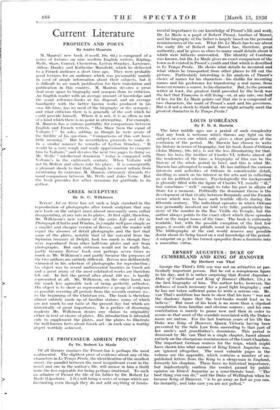Of all literary maniacs the Proust-fan is perhaps the most
sentimental. The slightest piece of evidence about any of the characters in Le Temps Perdu, the identification of the smallest street. the parallel between the most insignificant event in the novel and one in the author's life, will arouse in him a thrill. none the less enjoyable for being perhaps irrational. To such an admirer of Proust the life of his father by Dr.' Robert Le • • Masle (Lipschutz. 5 fr.) will bring a series of scraps which are fascinating even though they do not add anything of funda- mental importance to our knowledge of Proust's life and work. Dr. Le Masle is a pupil of Robert Proust, brother of Marcel, and his biography of the father is largely based on the personal reminiscences of the son. What Dr. Le Masle has to say about • the early life of Robert and Marcel has, therefore, great • authority,,atafhe gives us clues to many small details about it
• which were hitherto unrecorded. The identity of Combray was known, but Dr. Le Masle gives an exact comparison of the town as it existed in Proust's youth and that which is described ' in Le Temps Perdu. He shoWS what details he invented and what others he transported from other places to fill out the picture. Particularly interesting is. his analysis- cf Pmiust's choice of names for his characters—his dislike for inventing names and his preference for transferring a real name, from however remote a source, to his character. But, to the present writer at least, the greatest thrill provided by the book was the fact that Francoise is still living—or, at any rate, one half of her, for Dr. Le Masle points out that she is a compound of two characters, the maid of Proust's aunt and his governess. But is it not a shock to think that one might actually meet the greatest character in Lc Tramps Perdu














































 Previous page
Previous page